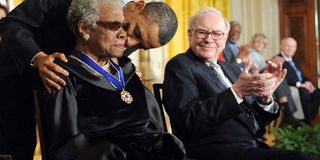Breaking News: At least 10 feared to have drowned in Makueni river
What Maya Angelou taught me

US President Barack Obama (C) kisses Dr. Maya Angelou. When news broke about the passing of one of my favourite authors, poets and life philosophers, Maya Angelou. She said of herself, ‘My life has been long, and believing that life loves the liver of it, I have dared to try many things, sometimes trembling but daring still.’ PHOTO/AFP/FILE
What you need to know:
- She would travel widely, make a home in Egypt working as a journalist in the 60s, live in Ghana as well as the US.
- In Still I Rise, she wrote, “Out of the huts of history’s shame/I rise. Up from a past that’s rooted in pain/I rise. I’m a black ocean/leaping and wide/Welling and swelling I bear in the tide. Leaving behind nights of terror and fear/ I rise. Into a daybreak that’s wondrously clear/I rise. Bringing the gifts that my ancestors gave/ I am the dream and the hope of the slave. I rise/I rise/I rise.”
“When you learn teach, when you get give.”
Maya Angelou
There are people whose presence enriches the world they inhabit, and when they leave, we are sad but glad that we shared the same time and space.
That’s how I felt when news broke about the passing of one of my favourite authors, poets and life philosophers, Maya Angelou. She said of herself, ‘My life has been long, and believing that life loves the liver of it, I have dared to try many things, sometimes trembling but daring still.’
And that daring led her to overcome poverty and sexual abuse in her childhood and play many diverse roles throughout her lifetime including singer, composer, dancer, waitress, even prostitute, actress before finding her voice and path in writing.
Small wonder that when she wrote her most acclaimed work, I Know Why the Caged Bird Sings, she was in her 40s and had packed a whole lot of life experience under her belt. And she was not about to stop.
BODY IMAGE
She became a civil rights activist, befriending Malcolm X and Martin Luther King Jr, an anti-apartheid activist, and campaigned for Hillary Clinton and Barack Obama in 2008. She was a lecturer, a position she held well into her 80s. In 2013, at the age of 85, she would write her seventh autobiography Mom & Me & Mom chronicalling her relationship with her mother.
The common thread in all her works was her social consciousness, whether she was discussing racism or the wonders of the female form.
In Phenomenal Woman she wrote, “Pretty women wonder where my secret lies/I’m not cute or built to suit a fashion model’s size/ But when I start to tell them/ they think I’m telling lies. I say, it’s in the reach of my arms/ the span of my hips/ the stride of my step/ The curl of my lips. I’m a woman. Phenomenal Woman/ That’s me.”
There was always this defiance, this non conformity that seemed to drive her towards creating her own unconventional path.
She would travel widely, make a home in Egypt working as a journalist in the 60s, live in Ghana as well as the US. In Still I Rise, she wrote, “Out of the huts of history’s shame/I rise. Up from a past that’s rooted in pain/I rise. I’m a black ocean/leaping and wide/Welling and swelling I bear in the tide. Leaving behind nights of terror and fear/ I rise. Into a daybreak that’s wondrously clear/I rise. Bringing the gifts that my ancestors gave/ I am the dream and the hope of the slave. I rise/I rise/I rise.”
She constantly refused to be confined into a stereotype, even a well meaning one. She would be criticised for writing poetry for Hallmark cards, and even two cookbooks when she was not even a chef.
We never met but her writing would link us inexplicably, and take me through moments of uncertainty.
She wrote and spoke with a motherly wisdom and wit only accessed by those who had lived life vocariously and some would say, seen it all.
LOVE YOURSELF
On relationships, she said, “I’ve learned that people will forget what you say, people will forget what you did, but people will never forget how you made them feel.” She would caution women saying, “When people tell you who they are the first time, believe them,” and “Never make someone a priority when all you are to them is an option.”
By the time she was the doting grandmother and sage that Oprah loved, and the world cherished, she had passed some treacherous paths yet lived to empower others through her personal pain. Her parents divorced when she was three and she was sent to live with her parternal grandmother, she was raped at seven by her mother’s boyfriend, became a single mother at 17.
Brought up during a period of deep racial division, she later would say, “I can be changed by what happens to me. But I refuse to be reduced by it.” She would be married twice and live with a South African freedom fighter in Egypt. She would say, “It’s one of the greatest gifts you can give yourself, to forgive. Forgive everybody.” Here was a woman who, in the final analysis, didn’t just write her truth, she lived it.





